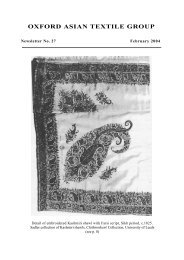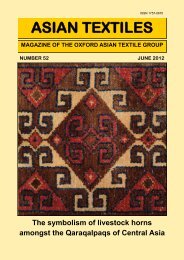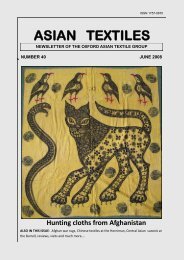ASIAN TEXTILES - OATG. Oxford Asian Textile Group
ASIAN TEXTILES - OATG. Oxford Asian Textile Group
ASIAN TEXTILES - OATG. Oxford Asian Textile Group
Create successful ePaper yourself
Turn your PDF publications into a flip-book with our unique Google optimized e-Paper software.
IBAN <strong>TEXTILES</strong><br />
16<br />
The island of Borneo is carved into three parts; the northern part makes up Malaysia with<br />
Brunei tucked neatly in the middle of the two Malaysian states of Sabah and Sarawak. The rest of<br />
the island belongs to Indonesia. In Sarawak, the Iban are found throughout much of the state. In<br />
the southern region is a river basin called the Saribas which has a weaving tradition that sets it<br />
apart from other regions. Economic prosperity and early interaction with foreign traders meant that<br />
Saribas women could easily purchase fine commercial threads instead of working on home-grown<br />
cotton which produced coarse threads and consequently bold designs.<br />
On these finely spun threads, Saribas weavers discovered that they could achieve finer designs<br />
when using the equally fine fibre of the lemba (curculigo villosa) in the ikat process. Within<br />
the Saribas, the leading family founded by its paramount chief Orang Kaya Pemancha Dana Bayang<br />
established themselves by a small creek named Stambak near the mouth of the Saribas River.<br />
The women of this family quickly excelled in this new method and developed it to a degree never<br />
before seen which soon became de rigueur throughout the region, and as Dr. Michael Heppell<br />
communicated to me, ―One thing I do remember being told in the Paku (2) was that a major design<br />
change occurred in the Saribas and the source of that was Stambak.‖ (3)<br />
This family traces its ancestry to the Orang Kaya Pemancha Dana Bayang, the ―most<br />
dreaded Saribas ‗pirate‘, the man who commanded the marauding fleets‖ (4) who had threatened<br />
to put Rajah James Brooke‘s head in a basket. (5) Brooke later wrote, ―The Orang Kaya Pomancha,<br />
of Sarebas, is now with me - the dreaded and the brave, as he is termed by the natives. He is<br />
small, plain-looking and old, with his left arm disabled, and his body scarred with spear wounds. I<br />
do not dislike the look of him, and of all the chiefs of that river I believe he is the most honest, and<br />
steers his course straight enough‖. (6)<br />
The Orang Kaya Pemancha Dana Bayang was succeeded by his son the Orang Kaya Aji Pati<br />
Malayu Duat Pengiran Bunsu who was colourfully described as one of the most cruel and<br />
treacherous head-hunters of those days. (7)<br />
His daughter, Mindu, married Panglima<br />
Budin Gerasi, the great-grandson of Unggang<br />
Lebor Menoa, a rival chief from the<br />
Upper Layar. (8) This arranged marriage<br />
pacified the ―smouldering dispute between<br />
two Iban families, like the feud between<br />
the Montagues and the Capulets, an important<br />
factor in local politics for years‖. (9)<br />
Panglima Budin Gerasi, the head of<br />
this extended kindred, pioneered the cultivation<br />
of coffee and rubber in the Saribas.<br />
―Among the first planters [of coffee] were<br />
leading Iban families in the middle Saribas<br />
who established their gardens early in 1889<br />
and obtained their first output in 1892. In<br />
1895 the Resident reported: The Stambok<br />
[i.e. Stambak] gardens are being enlarged.<br />
Gergasi [the Malay version of Budin's<br />
praise-name], the head of the house there<br />
owns quite eight hundred trees and employs<br />
labour (Dyak). His paddy farm this<br />
year was made for him by Malays on<br />
wages‘‖. (10)<br />
―In the riverine zone at Stambak, below<br />
Betong, the headman Budin (the coffee<br />
planter of the 1890s mentioned above)<br />
Great grandmother Sendi and I. Kuching, Xmas 1968 planted over 4,000 seedlings [of rubber] in
















